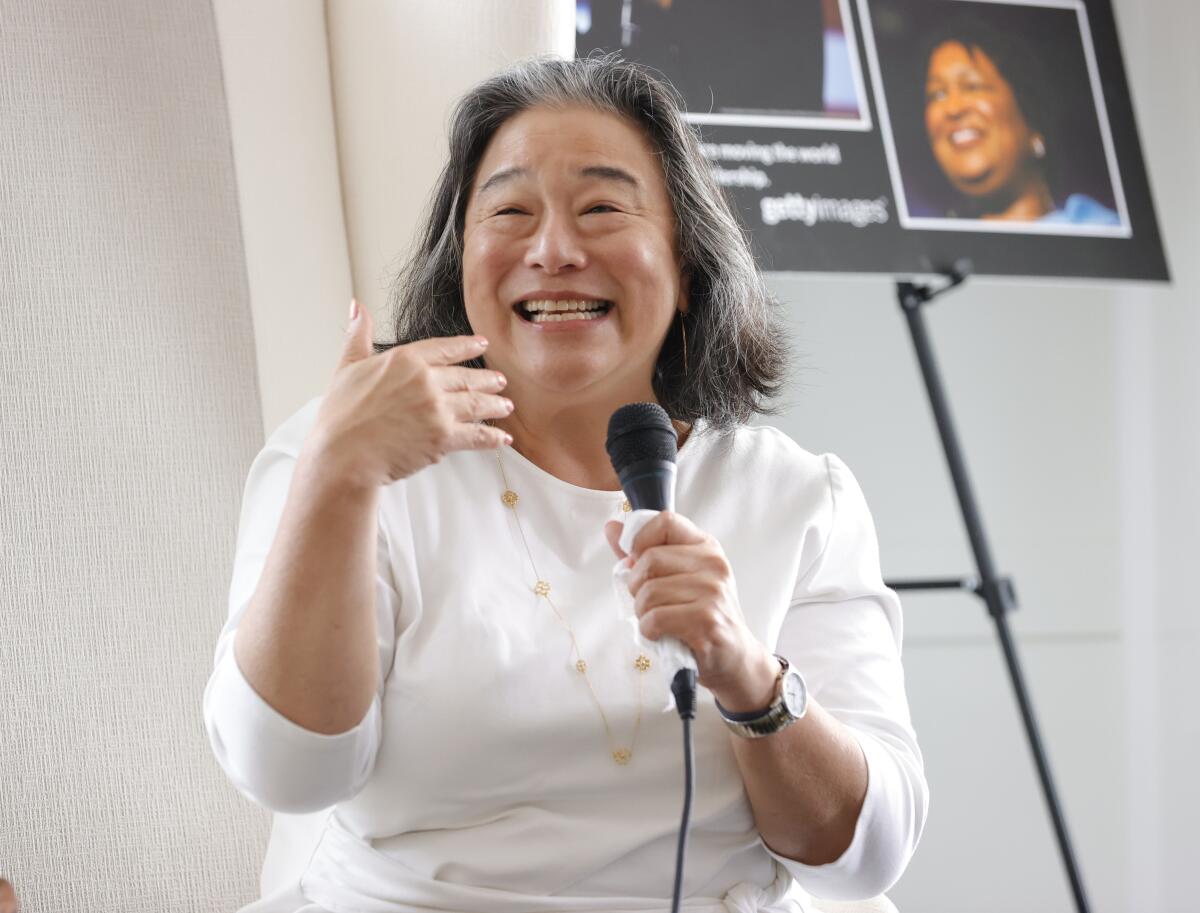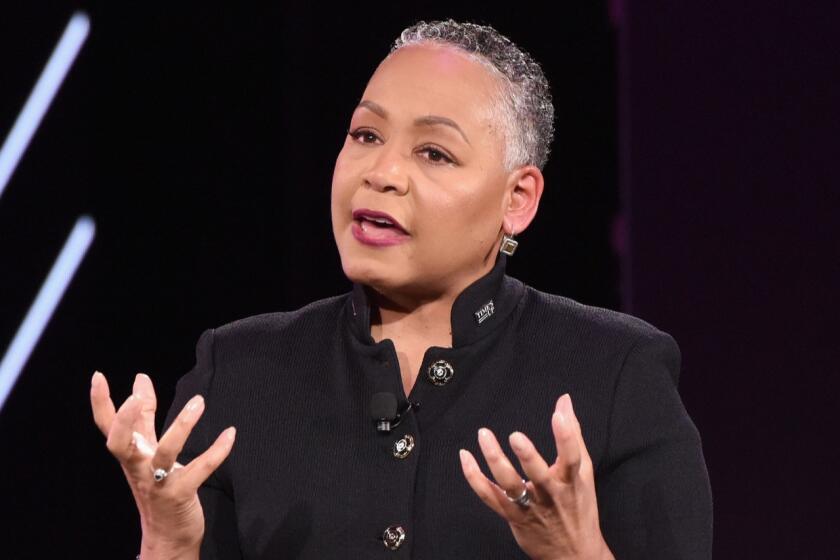Tainted by Cuomo scandal, can Time’s Up survive?

Time’s Up, which began as a sisterhood of powerful Hollywood women who vowed to upend the male-dominated status quo, is facing its own painful reckoning.
Reeling from revelations about its leaders’ ties to former New York Gov. Andrew Cuomo, the organization has come under sharp criticism. Former members of Time’s Up and some sexual abuse victims say the group has strayed from its mission, failed the women who needed its help the most — and allowed itself to be corrupted by the very power it once pledged to harness.
The crisis comes four years after the Harvey Weinstein scandal galvanized the #MeToo movement, prompting a parade of Hollywood elite led by Oprah Winfrey and Reese Witherspoon to proclaim their campaign at the 2018 Golden Globes awards show. Time’s Up raised $20 million to help sex abuse victims mount legal cases.
“Their potential was there from the beginning,” sexual assault survivor Alison Turkos said in an interview. “They touted their power and how much money they had raised, and they said they were going to do all these great things. But where did it all go?”
This week, Time’s Up announced a period of self-analysis. After initially downplaying its leaders’ involvement with Cuomo’s defense strategy, and after critical articles in the Daily Beast and New York Times, group members now acknowledge missteps. Cuomo resigned less than a month after the New York Attorney General’s Office alleged, in a scathing report, that he had sexually harassed nearly a dozen women. Cuomo denies the allegations.
On Monday, Time’s Up’s leaders conducted two private conference calls with group members to assess the damage. In advance of the meetings, Tina Tchen, Time’s Up president and chief executive, announced the group would hire an outside consultant to review Time’s Up’s participation in the Cuomo matter and make suggestions on strengthening internal controls. Members also said the organization recognizes the need to be more transparent when its leaders have conflicts of interest.
“We’re committed to rebuilding trust and leading responsibly in ways that honor and center the very people we want to serve,” Tchen wrote in a statement Sunday. Through a spokeswoman, Tchen declined an interview request.
But critics say Time’s Up seemed slow to recognize the magnitude of its public relations crisis after the New York Attorney General’s report revealed that one of its cofounders and a nationally prominent attorney, Roberta Kaplan, had participated in strategy sessions with Cuomo’s team after women began publicly accusing the former governor of harassment. Kaplan was Time’s Up chairwoman at the time.
The AG report also said that Kaplan consulted with Tchen, the CEO, earlier this year about how Cuomo should respond.
“I would never, nor have I ever, worked to discredit a survivor in any way,” Tchen said in an Aug. 4 statement, one day after the AG report was released, mentioning the Time’s Up involvement. “Secondly, I have never given advice to the Governor or his team.”
Amid the outcry, fellow board members nudged Kaplan — who, in her private law practice represents a senior Cuomo aide, Melissa DeRosa — to resign from the group, according to a person familiar with the matter but not authorized to comment.
In her Aug. 9 resignation letter, Kaplan wrote that she had “reluctantly come to the conclusion that an active litigation practice is no longer compatible with serving on the board of Time’s Up.”
Detractors say Time’s Up’s leaders’ support of Cuomo and its handling of the scandal demonstrates the group’s blind spots.
Interviews with several board members and former insiders paint a picture of an organization that, for much of its existence, has been in disarray. Some describe enthusiastic young women eagerly enlisting their support to Time’s Up because they believed such a high-caliber crowd — including Winfrey, Shonda Rhimes, Natalie Portman, Ava DuVernay and Eva Longoria — could shake up entrenched cultural norms, including a tolerance for bullying by powerful men.
But the nonprofit has struggled to live up to lofty expectations, including among former staffers.
“I didn’t feel like I was doing the work that I was hired for,” Megan D. Malloy, a digital media strategist and speech writer who left the organization in June 2020 after 13 months, said in an interview. “There was no thoughtful strategy.”
There were problems almost from the beginning, several former insiders said. The group took direction from board members with connections, the so-called “grasstops,” who had their own ideas on measures that Time’s Up should support. National efforts to shift the balance of power — and demand that institutions listen to the voices of women — immediately fell short, including during the contentious 2018 confirmation of Brett M. Kavanaugh to the U.S. Supreme Court.
It took more than nine months for Time’s Up to pick its first chief executive, Lisa Borders, who joined in October 2018 from the WNBA. The Los Angeles-based group broadened its scope to look beyond Hollywood and address larger issues of workplace safety, equal pay and parity in a variety of fields.
But it struggled to differentiate its Time’s Up Now advocacy work from that of the separate Time’s Up Legal Defense Fund.
And Borders lasted less than five months. She resigned under pressure in February 2019 after a Santa Monica woman accused Borders’ then-36-year-old son of inappropriately touching her after the woman invited him to her apartment for a massage. Borders was put in an untenable position of deciding between defending her son or the values of the organization.
Borders received more than $930,000 in compensation, according to the group’s 2018 and 2019 tax records.
Other high-level staff members of the charity were richly compensated. Rebecca Goldman, the treasurer, secretary and interim CEO received $475,000 from two Time’s Up affiliates in 2019.
When Lisa Borders announced her resignation this week as the inaugural chief executive of Time’s Up, she cited a need “to address family concerns that require my singular focus.”
Tchen, a longtime corporate lawyer and former chief of staff for former First Lady Michelle Obama, took the reins as president in November 2019. Politically active in Chicago, Tchen had been involved from the beginning and was an architect of Time’s Up signature legal defense fund, which is administered by the National Women’s Law Center.
But clashes over the group’s focus continued.
“We weren’t doing any real work to help survivors,” Malloy said. “Instead, we could easily get our priorities scrambled in a day because a board member would have an idea about some issue. Then we would have to drop everything.”
An example of that occurred in February 2020 during planning for a policy-focused campaign for paid leave for people dealing with childcare. Malloy said the staff was hurriedly recruited to help Tchen draft an online petition in support of Gayle King, co-anchor of “CBS This Morning,” who was facing a backlash for asking tough questions during CBS’ coverage of the death of Lakers legend Kobe Bryant. King had asked WNBA star Lisa Leslie about Bryant’s rape case.
Time’s Up published a statement, titled: “We would not be here today without journalists like Gayle King.”
A second former staff member also described being “pulled in a lot of different directions by powerful board members.” This person, who was not authorized to comment, also criticized the “mission creep,” as the group became involved in controversies that were not strictly about promoting workplace safety, leveling the power dynamic or coming to the aid of victims of sexual assault and harassment.
For example, Time’s Up launched a social media campaign blasting the Hollywood Foreign Press Assn., which owns the Golden Globes, for its lack of diversity and ethical lapses detailed in a Los Angeles Times investigation.
“It was shiny object syndrome,” Malloy said. “It was whatever is catching the most attention, then gets the most energy. And often, it was not what was in the best interest of survivors or the movement, long-term.”
One of the group’s co-founders, who was not authorized to speak publicly, summarized the dilemma facing the most prominent members: “When you have political influence, how do you best use it?”
Two former staff members said they raised objections during internal debates about whether Time’s Up should launch a consultancy to boost revenue by advising corporations and others grappling with sexual harassment claims.
The former workers said they told Time’s Up leaders that such a money-making venture would conflict with Time’s Up’s stated mission to fight “for a future where no one is harassed, assaulted, or discriminated against at work.”
“They are failing survivors,” said Turkos, who drafted an open letter to Time’s Up earlier this month, describing the ways that some activists felt the organization had let women down. It was signed by more than 100 women. “We were ignored and had doors slammed in our face.”
Malloy, the former staff member, added: “There is and was a deep sense of arrogance that they know better how to advocate for survivors than survivors do — because they are so powerful and so successful as individuals.”
But even critics of Time’s Up still want the organization to succeed.
“Can they come back from this? Yes,” Turkos said. “But, currently, they are not doing what it will take for them to recover. They are not listening to survivors, and they are not showing survivors that they care.”
Times staff writers Stacy Perman and Amy Kaufman contributed to this report.
More to Read
Inside the business of entertainment
The Wide Shot brings you news, analysis and insights on everything from streaming wars to production — and what it all means for the future.
You may occasionally receive promotional content from the Los Angeles Times.








